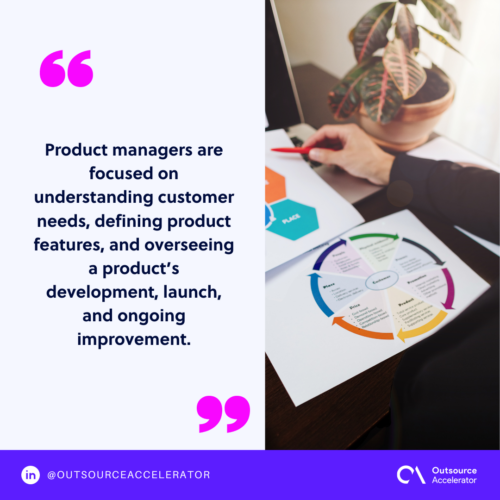Program manager vs. Product manager: Differences explained

Navigating the world of business management can sometimes feel like traversing a maze. This is especially true when it comes to distinguishing between roles like program manager vs. product manager.
Although they may seem alike at first glance, each carries its own unique set of responsibilities and objectives.
In this article, we’ll delve into the nuances of each position and compare them to project managers. We’ll also provide a simple comparison and help you determine whether your organization needs both.
What is a program manager?
A program manager oversees a portfolio of projects that are interconnected and aligned toward achieving strategic business goals.
This role’s primary focus is coordinating and managing the overall program, ensuring that it is executed effectively and delivers the desired outcomes.
Program managers are also responsible for establishing the program’s vision, setting objectives, and providing guidance to cross-functional teams.

Example of product management
Imagine a technology company launching a new mobile application suite. The program manager would be responsible for:
- Overseeing the development of the individual applications
- Coordinating efforts between engineering, design, and marketing teams
- Ensuring that all the applications work seamlessly together to meet the overall program goals
What is a product manager?
On the other hand, a product manager is responsible for the success of a specific product or a product line.
Product managers are focused on understanding customer needs, defining product features, and overseeing a product’s development, launch, and ongoing improvement.
They also act as the connection between various stakeholders, like customers, development teams, sales, and marketing.
Example of product management
Let’s consider a software company developing a new project management tool. The product manager would bring the product to life by:
- Conducting market research
- Defining the tool’s features and user experience
- Collaborating with the engineering team
Additionally, this specialist will work closely with marketing and sales teams to successfully launch and promote the tool.

Program manager vs. Product manager vs. Project manager
Before we dive deeper into the differences between program managers vs. product managers, it is essential to understand how they compare to project managers.
While all three roles drive the success of initiatives, they have distinct focuses and scopes.
What is a project manager?
Project managers handle the planning, execution, and closing of sole projects. They emphasize on supervising the timeline, resources, and tasks required to achieve project objectives.
These expert professionals are more focused on completing projects on time, within budget, and meeting quality standards.
Imagine a construction project to build a new office building. The project manager would be responsible for coordinating all aspects of the project.
This involves obtaining permits and hiring contractors to oversee the construction process and ensuring compliance with building codes.
Moreover, the project manager would communicate regularly with the client to:
- Provide updates on project milestones
- Address any concerns
- Ensure that the final result meets expectations
Program manager vs. Product manager: A quick comparison
Now that we have a clear understanding of the roles of program manager vs. product manager, let’s compare them across key dimensions:
| Aspect | Program manager | Product manager |
| Scope | Manages a portfolio of related projects and initiatives | Focuses on the development and lifecycle management of a specific product or service |
| Objective | Ensures alignment with business objectives and strategic goals | Drives product vision and strategy to meet customer needs and achieve market success |
| Responsibilities | Oversees program governance, stakeholder management, risk mitigation, and resource allocation | Defines product roadmap, gathers requirements, prioritizes features, and guides development teams |
| Metrics | Measures program success based on strategic objectives, ROI, and business outcomes | Keeps tabs on product KPIs such as user adoption, customer satisfaction, and revenue |
| Collaboration | Collaborates with cross-functional teams, project managers, and senior leadership | Works closely with other departments like design, engineering, sales, marketing, and customer support |
| Timeframe | Focuses on long-term planning and execution, spanning multiple projects and initiatives | Manages the product lifecycle from conception to launch and beyond, adapting to market changes |
| Decision-making | Makes strategic decisions that impact the entire program, balancing competing priorities and risks | Makes product decisions based on market research, customer feedback, and business goals |
Program manager vs. Product manager: Do you need both?
Now, the million-dollar question: Does your organization need both program managers and product managers?
The answer depends on factors such as the size and complexity of your organization, the nature of your projects and products, and your strategic objectives.
When to have both
Large organizations with diverse portfolios of projects and products often benefit from having dedicated program managers and product managers.
Program managers ensure alignment and coordination across multiple projects, while product managers focus on driving innovation and market success for individual products.

When to combine roles
In smaller organizations or startups with limited resources, it’s common for individuals to wear multiple hats.
In such cases, a hybrid role combining aspects of both program management and product management may be more practical.
All in all, it’s important to recognize the distinct roles and responsibilities of program managers and product managers.
By understanding the variation between these roles, organizations can make informed decisions on the need for both managers to drive overall success in their offerings.







 Independent
Independent




